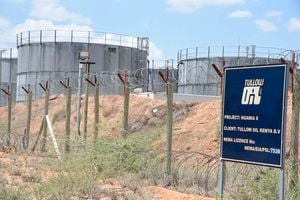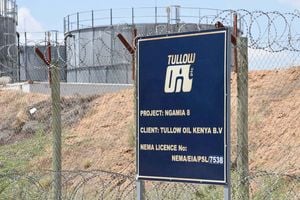
One of the buildings put up in Lodwar after the discovery of oil back in 2012. File | Nation
Before crude oil was discovered in 2012 by British exploration firm Tullow Oil, Lokichar was a typical town in Turkana County characterised by high levels of poverty, underdevelopment, and a poor road network.
The discovery brought new life to the remote town, located along the Lodwar-Kapenguria road, with locals and non-locals scrambling for job opportunities and engaging in competitive business activities, including accommodation, catering, mobile banking, fuel stations, and transportation.
Poor locals also benefited from basic social amenities such as water trucking services and the construction of health facilities and schools, provided through corporate social responsibility initiatives.
Roads leading to villages with oil wells were gravelled, and before the Early Oil Pilot Scheme (EOPS) commenced in 2018 — where trucks transported crude oil from Lokichar to the holding terminal in Changamwe, Mombasa — the main road was tarmacked.
During the EOPS period, locals like James Emuria from Nakukulas village held high expectations regarding the benefits of petroleum activities, particularly in terms of financial gains.
“We thought that once the crude oil was sold, Tullow Oil and the government would come back to us and share the proceeds. That never happened,” Mr Emuria said.
He explained that the subsequent scaling down of petroleum activities negatively impacted livelihoods, with businesses suffering losses and many employees returning to their villages.
“Graves of our relatives, which served as our primary evidence of land ownership, were not enough to negotiate compensation for the land used for petroleum activities. This was because the land was categorised as community land, and we lacked individual title deeds,” Mr Emuria added.
This situation forced many to revert to impoverished lifestyles, with limited information on when petroleum activities might resume.
In Lokichar town, the construction of the Lokichar-Nadapal Road, a section of the Lamu PortSouth Sudan-Ethiopia Transport (LAPSSET) Corridor connecting Kenya to South Sudan and Ethiopia, rekindled hope among those who were jobless.
Mr Peter Ekitela noted that the road project provided jobs to many youth, who had turned to alcohol, drug abuse, and criminal activities due to unemployment.
The completion of the road has given the town a facelift with well-constructed roads, but economic activities remain limited since petroleum operations have yet to resume.
Engineer Erick Wambua, Director for the East Africa Regional Trade Development Facilitation Project at KeNHA, stated that the road from Lokichar to Nadapal, spanning about 327 kilometres, is now ready for full activation.
With the support of the Turkana County government, villagers are positioning themselves to benefit once a strategic partner is secured. County Land Management Coordinator Vincent Agevi, in a letter dated November 14, 2024, invited locals from Nakukulas village on behalf of the State Department for Lands and Physical Planning to attend the launch of title deed distribution on 3 December 2024 at the Turkana South Deputy County Commissioner’s office in Lokichar town.
“During the event, the commuTurkana dashed oil hopes and a town left high, dry cities will be briefed on the benefits and responsibilities of land ownership, marking a historic moment crucial to enhancing land tenure security and fostering sustainable development,” he said.
This initiative follows a survey of community lands in Turkana South and Turkana East, undertaken by technical staff from the County Directorates of Lands, Housing, Public Works, and Urban Areas Management, alongside officers from the National Government’s Ministry of Lands.
The Food and Agriculture Organisation (FAO) supported the initiative through its partnership with the County under the five-year Digital Land Governance Programme.
The initiative aligns with the Community Land Act of 2016 and the county’s goal to ensure all land in Turkana is properly surveyed, mapped, and titled. County government officials noted that the exercise reflects Governor Jeremiah Lomorukai’s commitment to securing land tenure for Turkana residents by collaborating closely with relevant national authorities responsible for community land adjudication.
Energy and Petroleum Cabinet Secretary Opiyo Wandayi stated that Tullow Oil remains present in the region but lacks the requisite capacity to commercially develop the oil reserves in the South Lokichar Basin.
“The project is not dead but has merely been on hold. The government has sought a strategic partner and financial aid of approximately $3.5 billion, following the exit of Total and Africa Oil, which together held a 50 per cent stake in the project,” Mr Wandayi revealed in August during his vetting.
During a Senate Committee on Energy hearing in September, Tullow Kenya BV Managing Director Madhan Srinivasan reaffirmed the company’s commitment to Project Oil Kenya in Turkana, working closely with stakeholders, including the government, the Energy and Petroleum Regulatory Authority (Epra), and the host community.
He stated that Tullow had submitted a Field Development Plan (FDP) in March 2023 and was working on final revisions based on feedback from EPRA. “Upon receiving final approval, we can commence critical workstreams to enable the project to reach a final investment decision (FID).”
He added that unlocking value from Kenya’s oil discoveries remains a key catalyst for Tullow, expressing confidence that the development of the substantial resource base could transform Kenya’s energy landscape, delivering financial and social benefits to the nation.









